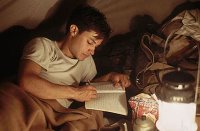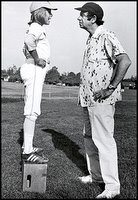
2005, US, directed by Wes Craven
It's nice to know that at least some people in Hollywood realize that there's no shame in turning out a well-made B-picture, rather than an overfed A-lister that fails to satisfy. There's absolutely no fat in Red Eye's 85 minutes, with Wes Craven signalling his intent in the lean, clever credits sequence. The plot swings rapidly into action as Cillian Murphy - so blue-eyed you know he's got to be wicked - bumps into hotel manager Rachel McAdams (on quite a roll after The Notebook and Wedding Crashers) as she's about to board a late-night flight home. After they share a delay-induced drink, he ends up in the seat beside her on the plane - but we're quickly aware that there's no coincidence, as he needs her management talent to assist in a nefarious plot to off a high-ranking official. It doesn't do well to examine some of the plot holes, but then there's rarely time as the film, with more than a few nods to Hitchcock in the on-plane sequences, zips along. McAdams is a credibly spunky heroine - you'll want to cheer her on as things get hairy - and Murphy seems to enjoy himself no end even when his character is being so comprehensively outsmarted. It's nice to see Craven so clearly in control of his material here: the horrors are more mundane, though no less creepy for that, but the old dog has a few tricks left in him yet, after a string of misfires.







